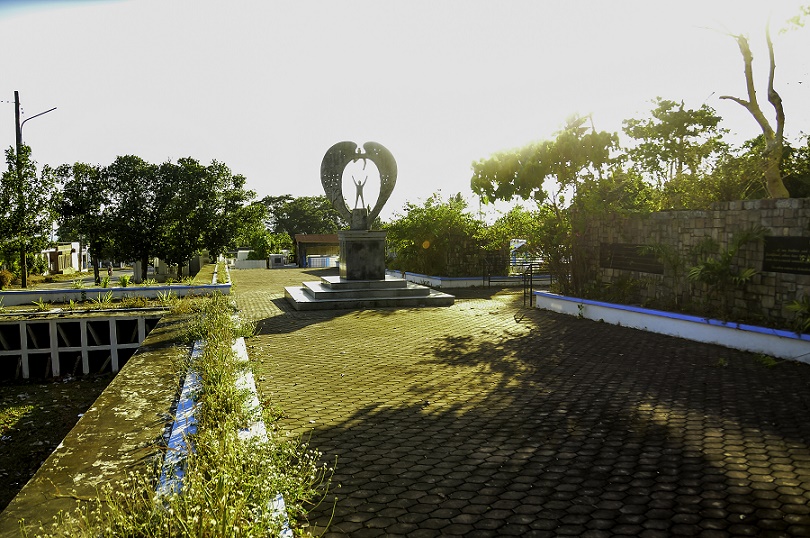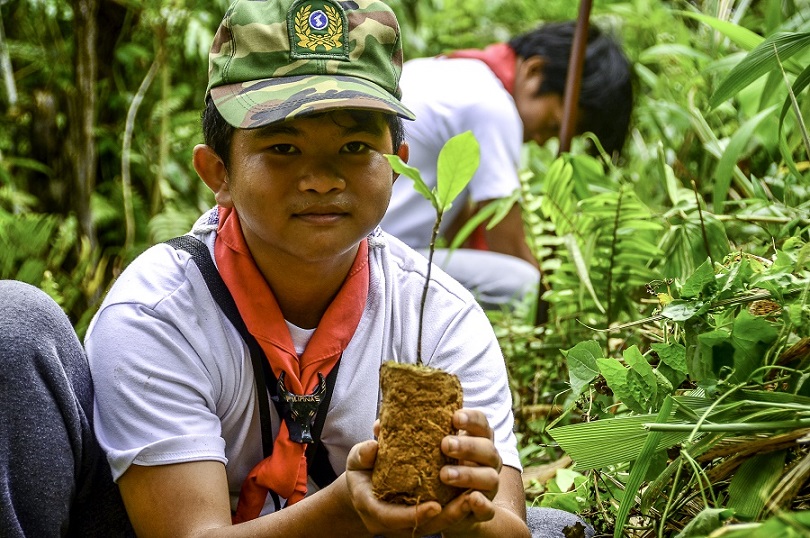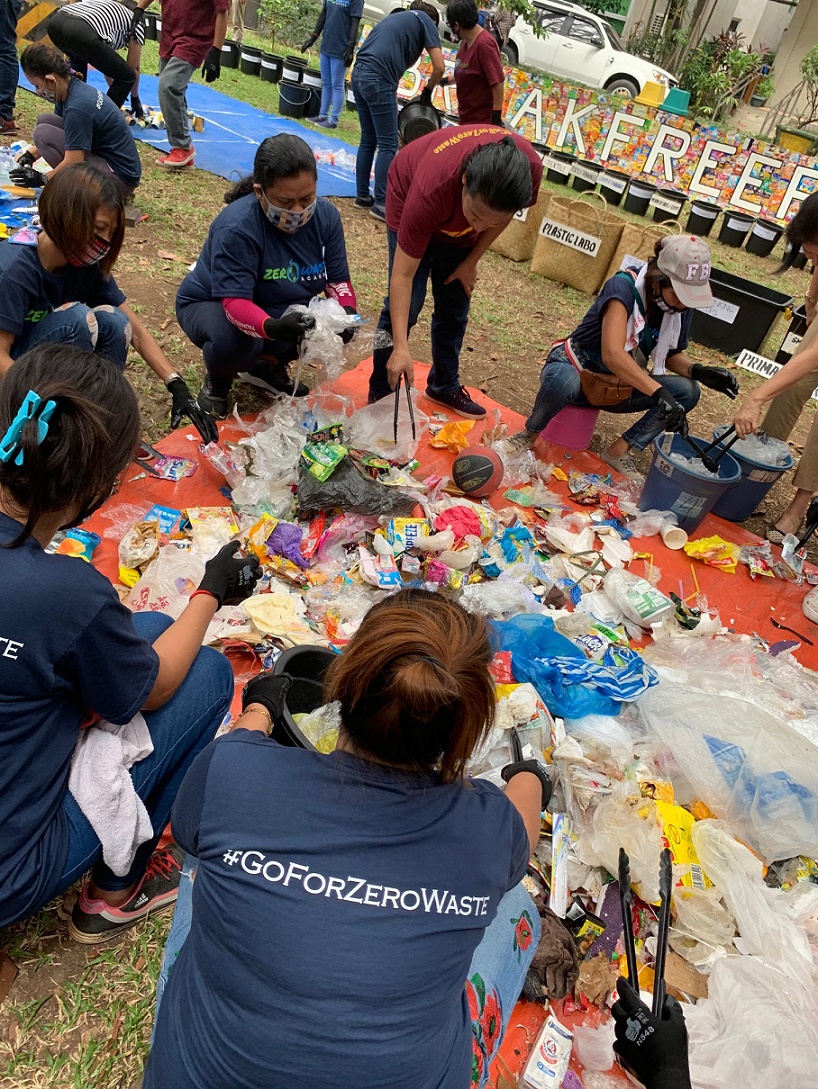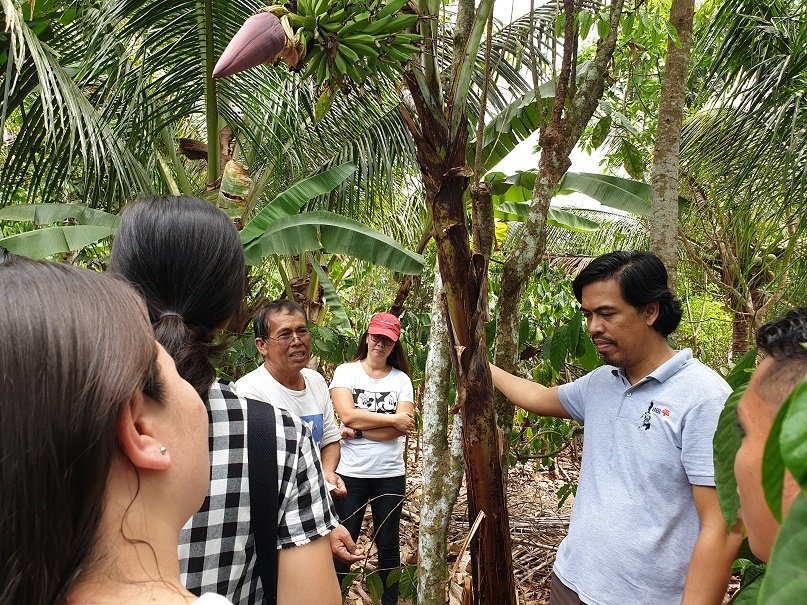
Farmer Julian Aguilar tells journalists of the advantages of integrated farming. Photo by Ellen T. Tordesillas
What better way to learn about how Climate Change affects people’s daily lives than a visit to a farm and talk with farmers?
That’s what a group of journalists in Metro Manila did when they visited a climate-smart farm in Silang, Cavite last April 9.
VERA Files organized a trip to the International Institute of Rural Reconstruction (IIRR), an international rural development organization to learn about climate-smart agriculture. The study tour started with an overview about climate-smart agriculture. The presentation went down to the basics of science, greenhouse effect, and ways to mitigate it.
Climate-resilient agriculture is “really about three things: food security, climate change adaptation, and climate change mitigation. In the Philippines, mitigation is almost negligible because our agriculture doesn’t contribute as much as other countries,” said Rene Vidallo, IIRR Philippine program director.
He said people dependent on climate-sensitive livelihoods but who have limited access to resources and info-sharing are among the most affected due to climate change.
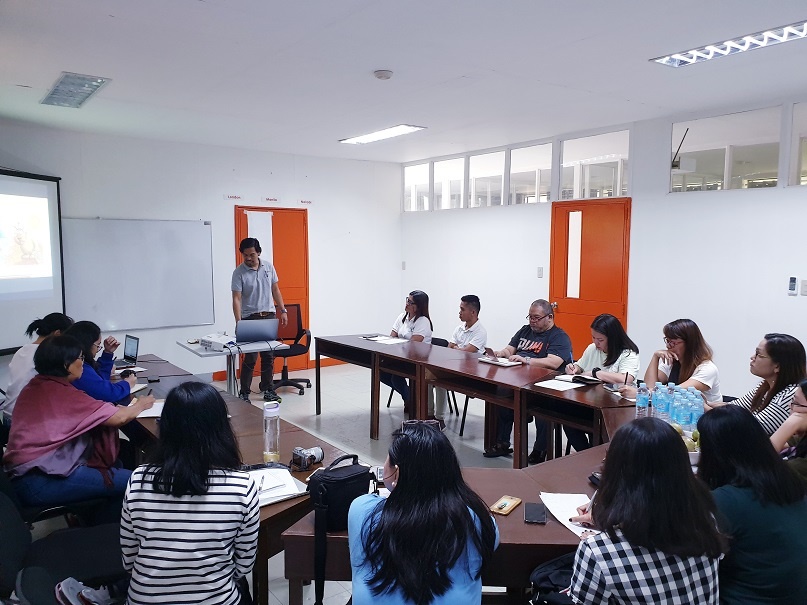
Rene Vidallo,Philippine program director of the International Institute of Rural Reconstruction give visiting journalists an overview about climate smart agriculture. Photo by Megs Roque.
By 2050, it is estimated that yields of corn, rice, wheat, and soybean all need to increase by 60% to meet the global demand. Even yields today are falling short, according to Vidallo.
In planting crops, he said climate-resilient farming methods revolve around crop diversification when main crops are not in season; soil and nutrient management; carbon emission reduction; and the efficient use of water and energy to improve yield.
Vidallo invited two of their local partners from Quezon province to share with reporters their experience in practicing climate-smart agriculture: Gloria P. Macaraig, president of Guinayangan Native Pig Federation (GUINAPIG Federation) and Angelo Ken Flores, president of the 4H Club.
GUINAPIG is a women’s project and its sole requirement for admission into the group is that members rear a native pig.
Macaraig said native pigs are more resistant to common parasites, pests and diseases unlike imported breeds. They usealternative pig feed formulation consisting mostly offarm produce such as coconut meat and vegetables which is probably why native pigs are tastier, have higher protein content and lower fat and cholesterol.
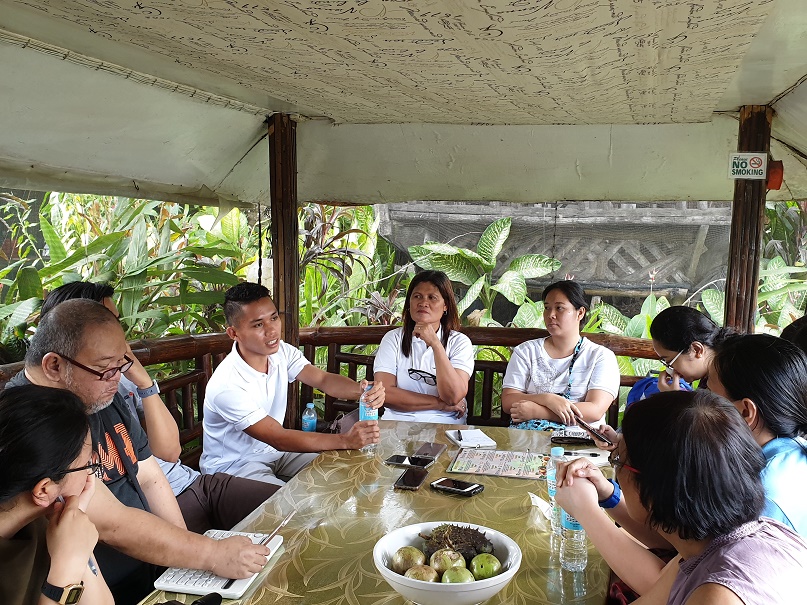
Gloria P. Macaraig, president of Guinayangan Native Pig Federation and Angelo Ken Flores, president of the 4H Club share with reporters the joys and challenges of practicing climate smart agriculture in Quezon province.
“Other than caring for native pigs, we built a farmer learning group about the different kinds of pig feed. The group we built holds meetings every month to talk about the importance of our group and to save at least P20 per member,” Macaraig said
“Every year there is a graduation where our savings are returned to members. This is exclusive for those who have been members for at least two years. We will save what we can earn for the needs of the family,” she continued.
Flores said the 4H represents ‘head, heart, hands, and health’. It’s an organization of young farmers because they want to inculcate love of farming to the young people. Some of their members are students, including a seven-year-old.
He said it is important for the younger generation to take an interest in farming because “the average age of farmers in the Philippines is 57.”
The group also visited the farm of Julian Aguilar, 65, who practices crop diversification. His main crop is coffee, but he also has coconuts, pineapple, bananas, cassava, cucumbers, chillies, and many other plants.
He also has a pig farm.
Mang Julian faces a problem that is common among his generation of farmers: the lack of interest of his children in farming. He said all his three children prefer desk jobs.
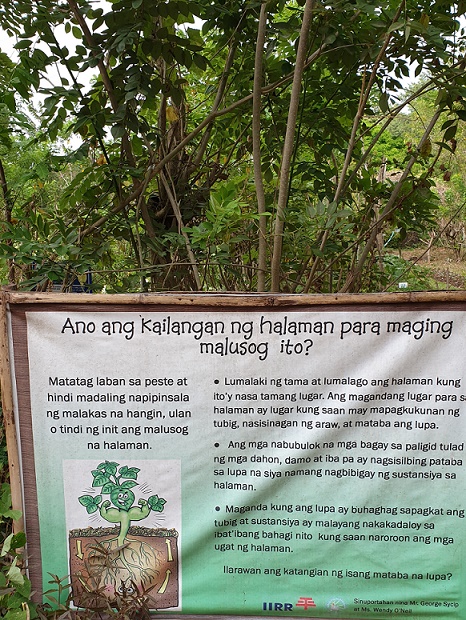
At IIRR’s Bio Intensive Gardening, nature plays a major role.
The group also visited IIRR’s Bio Intensive Gardening (BIG) project which uses available natural resources and does not rely on chemical inputs.
BIG utilizes locally-produced seeds and fertilizers, thus yielding low carbon footprint. Food produced are safe and free of pesticide residues. A deep-dug bed is essential for BIG to be able to conserve water and moisture in the soil. During summer, the garden is planted with legumes to keep microbes alive, reduce weed growth, and keep soil temperature low.
Kakawate trees are planted around the garden to keep the environment cool and to serve as barriers against strong winds. Its leaves are used as fertilizers, which stores carbon in the soil unlike chemical fertilizers.
The group’s last stop was Tinabunan Elementary School which has incorporated in its curriculum climate smart agriculture. It maintains a farm where students help cultivate.
Agriculture Teacher Mary Anne Galas said she lets her students help in tending the plants in the garden during her class.
“The students, during early Monday morning flag ceremonies, are also taught about the ‘plant of the day’ and its qualities, such as how it is grown and what benefits it gives to its consumers,” she said.
Harvest from the garden is consumed by the students themselves.
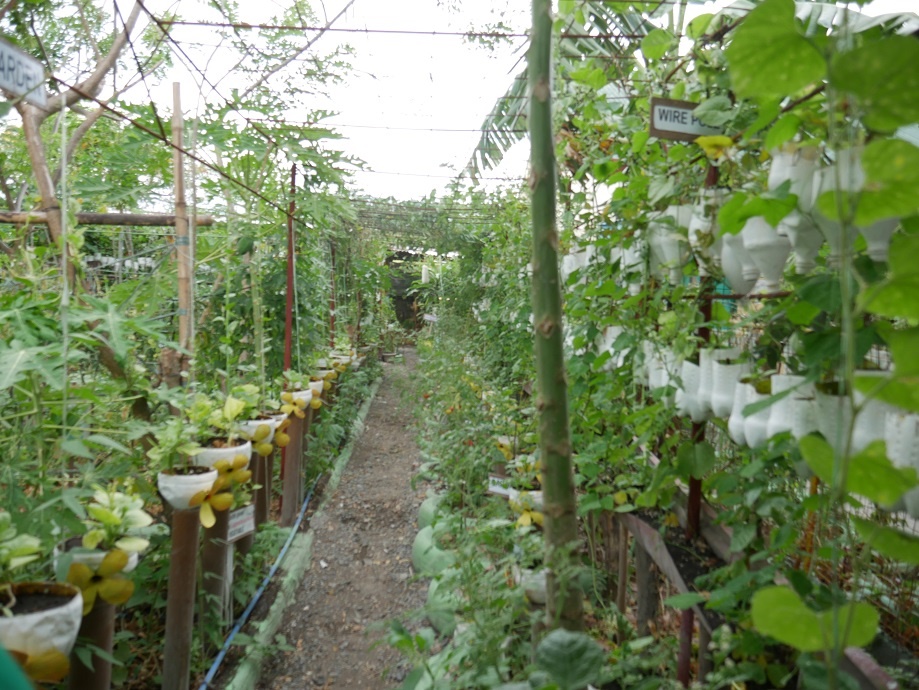
Urban gardening at the Tinabunan Elementary School. Photo by Ellen T. Tordesillas.
Other than teaching students, the school also keeps a record of wasted and severely wasted children, or those suffering from malnutrition, under their feeding program. At the end of the school year, results would show that students consistently gained more weight and became healthier.
The journalists who joined the field trip included Angelica Yang, a freelance reporter who contributes to ABS-CBN online, Angelle de Leon of Malaya Business Insight, Arpee Lazaro of Radyo Pilipinas Dos, Jhesset Enano of Philippine Daily Inquirer,Joyce Rocamora of the Philippine News Agency, Vanessa Evangelista and Zanneth Lago of CDL Productions, and Ellen Tordesillas of VERA Files.
Lazaro said he learned “the mastery of plants is vital to farming. It’s not just a matter of waking up early and being at the farm. I learned that there is a science to agriculture and that farmers would benefit greatly if they had training and retraining regularly to keep themselves updated of the latest techniques in farming and livestock raising.”
“I believe students should take this trip. It must be erased from their minds that farming is an uneducated person’s living. It is not. Far from it,” he added.
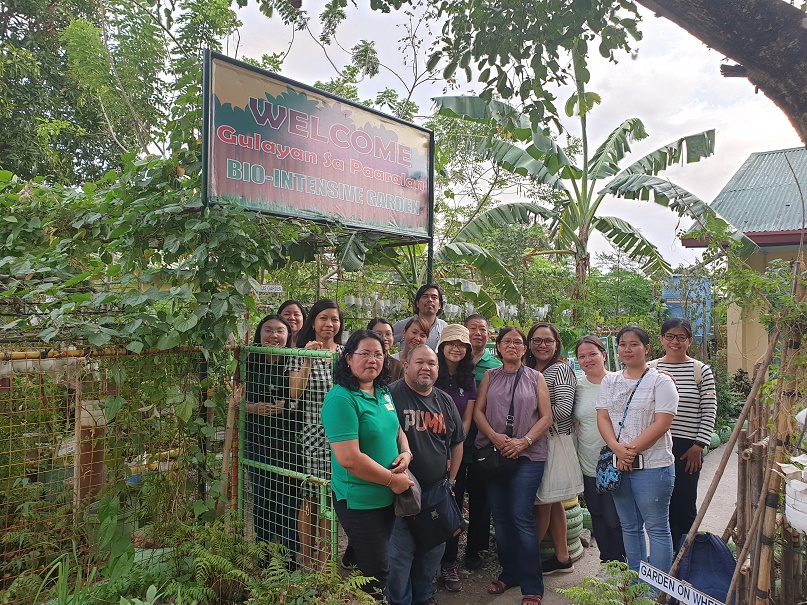 Reporters were impressed with Tinabunan Elementary School’s mini farm.
Reporters were impressed with Tinabunan Elementary School’s mini farm.
This story is produced by VERA Files under a
project supported by the Internews’ Earth Journalism Network, which aims
to empower journalists from developing countries to cover the
environment more effectively


